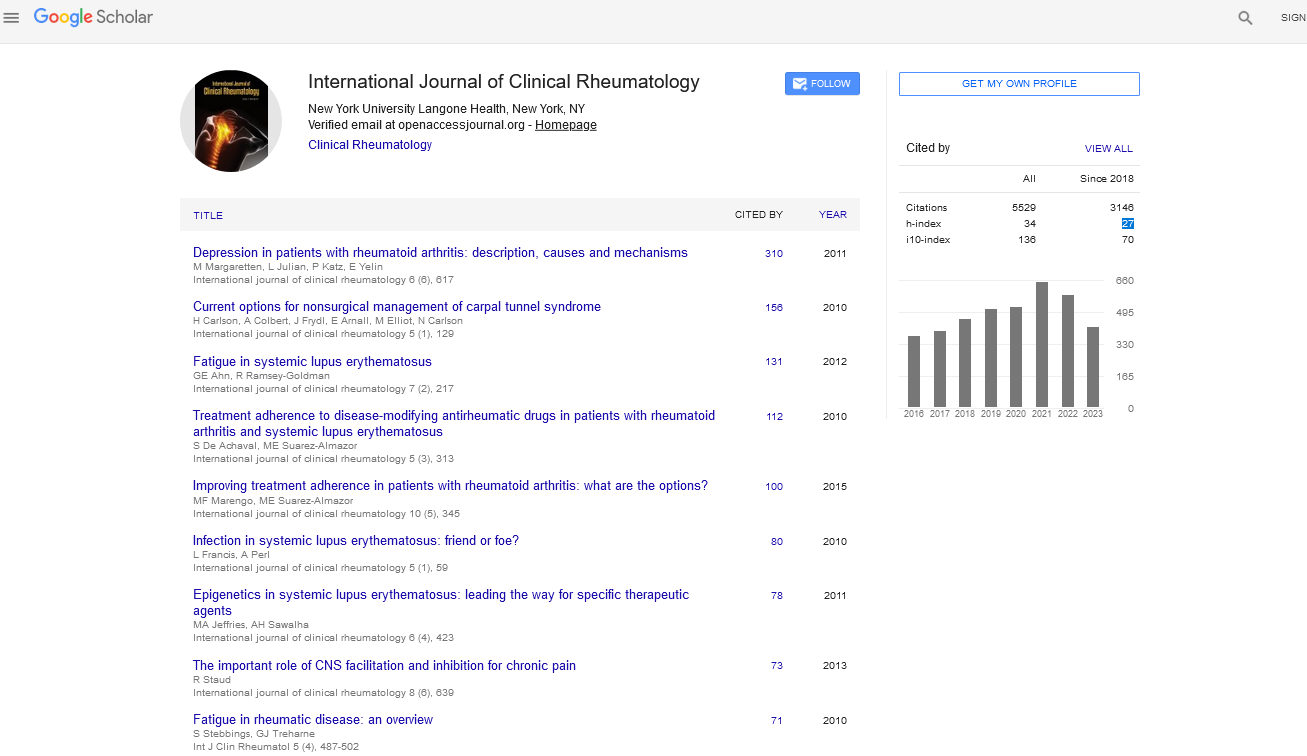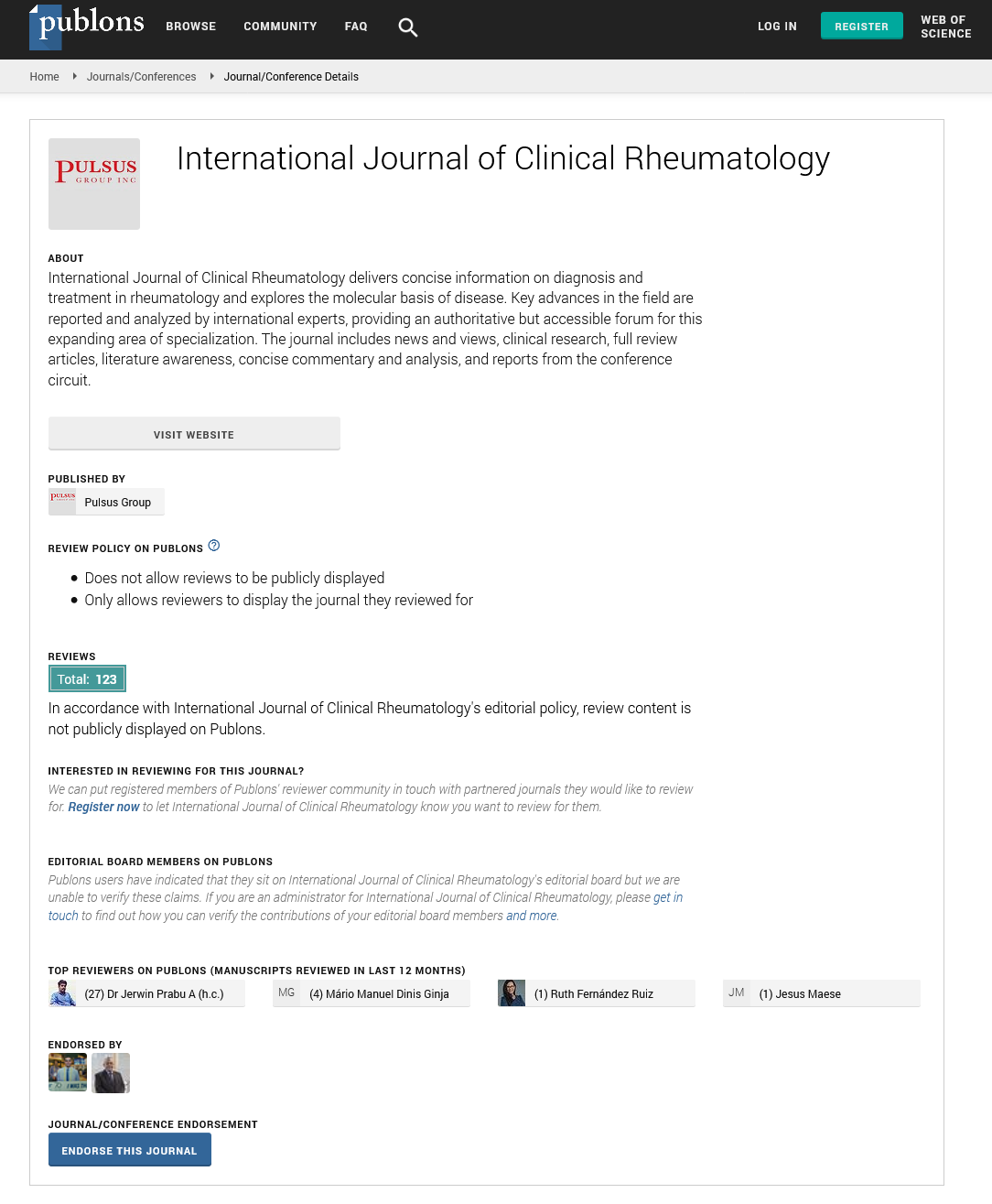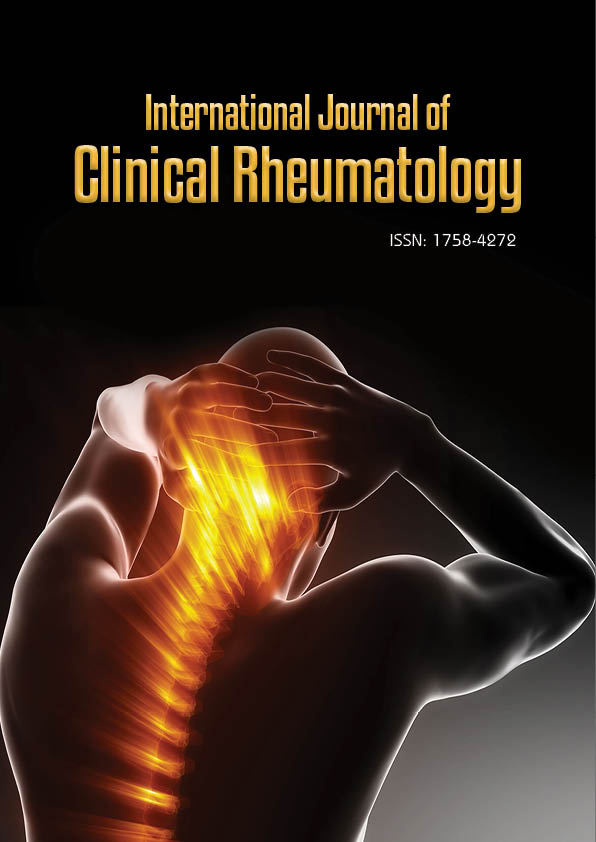Mini Review - International Journal of Clinical Rheumatology (2019) Volume 14, Issue 4
Associations of intestinal dysbiosis and T cell dysfunctions in patients with collagen related diseases, such as Behcet's disease and relapsing polychondritis
- Corresponding Author:
- Jun Shimizu
Department of Immunology and Medicine
St. Marianna University School of Medicine
Kawasaki 216-8511, Japan
E-mail:jshimizu@marianna-u.ac.jp
Abstract
Much attention has been focused on the relationships between gut microbiota and innate/adaptive immune systems in human diseases. We investigated bacterial composition and gene functions of the gut microbiota in two human immune disorders, "Behcet's Disease (BD)" and "Relapsing Polychondritis (RP)", with a metagenomic analysis by using a next generation sequencer. We found that distinctive features of gut microbiota existed in patients with BD, patients with RP, and normal individuals, suggesting a potential impact of the microbes to the intestine, as so called "dysbiosis" (unfavorable change of gut microbiota). We observed skewed T cell differentiation in both of the human diseases and speculated that there was a causal relationship between gut microbiota and T cells. To date, it was thought that some of the most important factors of T cell differentiation in the intestine were Short-Chain Fatty Acids (SCFAs). Several gut microbes provide SCFAs to the intestinal epithelial cells by the fermentation of dietary fibers. It is possible that characteristic and distinctive gut microbes lead to similar T cell dysfunctions in the intestine, contributing to development of both BD and RP.
Keywords:
gut microbiota • Behcet's disease • relapsing polychondritis • Th17 • Treg
Introduction
Immunocompetent cells in the intestine distinguish pathogenic microbes from commensal bacteria [1]. Helper T type 17 (Th17) cells maintain mucosal barrier function from microbial pathogens by the production of several cytokines, such as interleukin (IL)17 and IL22 [1]. In contrast, commensal bacteria produce several metabolites and induce regulatory T (Treg) cells to reduce the inflammation of the mucosa [1]. Among the bacterial metabolites, Short-Chain Fatty Acids (SCFAs), such as propionate and butyrate, are some of the most important molecules for the maintenance of intestinal homeostasis, as inducers of Treg cells and energy sources of the intestinal epithelial cells [2-5]. Several commensal bacteria in the intestine produce SCFAs by the fermentation of so called dietary fibers [2,6].
We hypothesized that the mutual interactions among gut microbes, T cells, and intestinal epithelial cells were disrupted in several human immune disorders. We conducted a metagenomic analysis in two immune disorders, namely Behcet's Disease (BD) and Relapsing Polychondritis (RP). We then assessed T cell function using cell culture assays in the patients. Here, we propose possible pathogenic relationships between gut microbes and T cells based on our findings [7-12].
Intestinal dysbiosis and skewed T cell responses in BD
BD is a systemic disorder characterized by recurrent oral aphthous ulcers, genital ulcers, uveitis, and skin lesions. Although the pathogenesis of BD is still largely unknown, it is thought that the immune dysfunction forms a part of the pathological condition [13].
First, activation of immunocompetent cells, such as neutrophils and T cells, was observed and the cells migrated frequently into the lesions. Second, hypersensitivity of skin and mucosa was observed against several microorganisms. Third, susceptibility of BD is strongly associated with the presence of HLA-B51 allele.
In BD gut microbiota, relative abundance of the genus Bifidobacterium and the genus Lactobacillus increased significantly in patients with BD [7,8]. Several SCFA-producing bacteria, such as Megamonas hypermegale and Butyrivibrio species, decreased significantly in BD patients [8]. A previous research of BD gut microbiota has demonstrated low frequencies of SCFAproducing bacteria and an actual reduction in the concentration of a SCFA (butyrate) in the feces [14].
For effective SCFA production, intestinal microbes require several gene functions on glycolysis (Figure 1A) [6]. We found that gene functions of the pentose phosphate pathway and inosine monophosphate biosynthesis were predominant in the gut microbes of BD compared with those of normal individuals (Figure 1B) [8]. The high proportion of the gene functions may lead to a relative reduction in the glycolysis pathway and subsequent decreased production of SCFAs by the intestinal microbes of BD (Figure 1B).
Figure 1: Schematic representation of the glucose metabolic pathway and gut bacterial gene function alteration of the pathway in BD and RP. (A) Bacterial gene functions in normal individuals. Short-chain fatty acid production of gut microbes requires several gene functions for the glycolysis. (B) Abundant gene functions in BD. Gene functions for the pentose phosphate pathway and inosine monophosphate biosynthesis were upregulated in the gut microbes of BD compared with those of normal individuals, suggesting a relative reduction in the glycolysis pathway and subsequent decreased production of shortchain fatty acids by the intestinal microbes of BD. (C) Abundant gene functions in RP. Gene functions for the glycolysis and citrate cycle were upregulated in the gut microbes of BD compared with those of normal individuals, suggesting increased production of short-chain fatty acids, especially propionate, by the intestinal microbes of RP.
In view of the balance between Th17 cells and Treg cells [1,15], decreased concentration of SCFAs in the intestine may lead to enhanced Th17 responses in patients with BD, being compatible with our previous findings [9,10]. Indeed, Th17 cell frequencies increased significantly in freshly separated Peripheral Blood Mononuclear Cells (PBMCs) of BD patients [9,10]. BD T cells produced significantly higher amounts of IL17 upon Th17 inducing culture condition, namely in the presence of IL1β, IL6, IL23, tumor necrosis factor β, and transforming growth factor β [10]. Thus, we suggested that gut microbiota had a potential to affect T cell responses in patients with BD [12].
Intestinal dysbiosis and skewed T cell responses in RP
RP is a degenerative disease characterized by recurrent and episodic inflammation of cartilage of the whole body. Major presenting features include chondritis of ear, nose, eye, and airway. Degeneration of laryngeal and tracheal cartilage was thought as a major cause of morbidity and mortality through infection and airway collapse [16-18].
Although the etiology is not well understood, from the findings of the autoantibodies [19] and an inflammatory cytokine profile [20], systemic immune dysregulation is thought to play a role in the pathogenesis. BD and RP sometimes shared several common clinical features in the disease course. Patients with MAGIC syndrome (Mouth and genital ulcers with inflamed cartilage) fulfill clinical criteria of both RP and BD.
In contrast to BD gut microbiota, relative abundance of propionate, one of SCFA, producing bacteria, such as Veillonella parvula, Bacteroides eggerthii, and Bacteroides fragilis, increased significantly in RP patients and gene functions on the glycolysis and citrate cycle were highly prevalent in RP gut microbes (Figure 1C) [11], suggesting enhanced production of propionate in the intestine. High concentrations of propionate in the intestine induce efficiently IL10-producing Treg cells [3]. We then conducted a cell culture assay using PBMCs of patients with RP. 6 and 24 hours after the initiation of cell culture assay, IL10 gene expressions were significantly lower in RP patients than those in normal individuals [11]. Decreased Treg cell function may lead to chondritis of patients with RP, because it was reported that IL10 promoted chondrogenic differentiation [21,22] and induced protective responses in cartilage against compression injury [21].
Conclusion
Relative abundance of SCFA-producing bacteria was suggested to associate with the imbalance between Th17 cells and Treg cells. We found that gut microbiota alteration and skewed T cell responses existed simultaneously both in patients with BD and in patients with RP, possibly because of dysregulated production of distinctive SCFAs in the intestine. Longitudinal studies are needed to assess the gut-T cell interactions upon internal and external perturbations, such as tissue inflammation, infections, and dietary changes, to establish effective interventions of the diseases.
References
- Omenetti S, Pizarro TT. The Treg/Th17 Axis: A Dynamic Balance Regulated by the Gut Microbiome. Front. Immunol. 6, 639 (2015).
- Nicholson JK, Holmes E, Kinross J et al. Host-gut microbiota metabolic interactions. Science. 336(6086), 1262–1267 (2012).
- Smith PM, Howitt MR, Panikov N et al. The microbial metabolites, short-chain fatty acids, regulate colonic Treg cell homeostasis. Science. 341(6145), 569–573 (2013).
- Ivanov II, Atarashi K, Manel N et al. Induction of intestinal Th17 cells by segmented filamentous bacteria. Cell. 139(3), 485–498 (2009).
- Atarashi K, Tanoue T, Shima T et al. Induction of colonic regulatory T cells by indigenous Clostridium species. Science. 331(6015): 337–341 (2011).
- Louis P, Flint HJ. Formation of propionate and butyrate by the human colonic microbiota. Environ. Microbiol. 19(1), 29–41 (2017).
- Shimizu J, Kubota T, Takada E et al. Bifidobacteria abundance-featured gut microbiota compositional change in patients with Behcet's disease. PLoS One. 11, e0153746 (2016).
- Shimizu J, Kubota T, Takada E et al. Relative abundance of Megamonas hypermegale and Butyrivibrio species decreased in the intestine and its possible association with the T cell aberration by metabolite alteration in patients with Behcet's disease. Clin. Rheumatol. 38(5), 1437–1445 (2019).
- Shimizu J, Takai K, Fujiwara N et al. Excessive CD4+ T cells co-expressing interleukin-17 and interferon-γ in patients with Behçet's disease. Clin. Exp. Immunol. 168(1), 68–74 (2012).
- Shimizu J, Takai K, Takada E et al. Possible association of proinflammatory cytokines including IL1β and TNFα with enhanced Th17 cell differentiation in patients with Behcet's disease. Clin. Rheumatol. 35(7), 1857–1863 (2016).
- Shimizu J, Kubota T, Takada E et al. Propionate-producing bacteria in the intestine may associate with skewed responses of IL10-producing regulatory T cells in patients with relapsing polychondritis. PLoS One. 13, e0203657 (2018).
- Shimizu J, Suzuki N. Enhanced Th17 responses with intestinal dysbiosis in human allergic, inflammatory, and autoimmune diseases. Biomed. Res. Clin. Pract. 1(3), 58–61 (2016).
- Sakane T, Takeno M, Suzuki N et al. Behçet’s disease. N. Engl. J. Med. 341(17), 1284–1291 (1999).
- Consolandi C, Turroni S, Emmi G et al. Behçet's syndrome patients exhibit specific microbiome signature. Autoimmun. Rev. 14(4), 269–276 (2015).
- Luo A, Leach ST, Barres R et al. The microbiota and epigenetic regulation of T helper 17/regulatory T cells: In search of a balanced immune system. Front. Immunol. 8, 417 (2017).
- Oka H, Yamano Y, Shimizu J et al. A large-scale survey of patients with relapsing polychondritis in Japan. Inflamm. Regen. 34(3), 149–156 (2014).
- Shimizu J, Yamano Y, Yudoh K et al. Organ involvement pattern suggests subgroups within relapsing polychondritis: comment on the article by Dion et al. Arthritis Rheumatol. 70(1), 148–149 (2018).
- Shimizu J, Yamano Y, Kawahata K et al. Relapsing polychondritis patients were divided into three subgroups: patients with respiratory involvement (R subgroup), patients with auricular involvement (A subgroup), and overlapping patients with both involvements (O subgroup), and each group had distinctive clinical characteristics. Medicine (Baltimore). 97(42), e12837 (2018).
- Foidart JM, Abe S, Martin GR et al. Antibodies to type II collagen in relapsing polychondritis. N. Engl. J. Med. 299, 1203–1207 (1978).
- Sato T, Yamano Y, Tomaru U et al. Serum level of soluble triggering receptor expressed on myeloid cells-1 as a biomarker of disease activity in relapsing polychondritis. Mod. Rheumatol. 24, 129–136 (2014).
- Behrendt P, Feldheim M, Preusse-Prange A et al. Chondrogenic potential of IL-10 in mechanically injured cartilage and cellularized collagen ACI grafts. Osteoarthritis Cartilage. 26(2), 264–275 (2018).
- Jung YK, Kim GW, Park HR et al. Role of interleukin-10 in endochondral bone formation in mice: anabolic effect via the bone morphogenetic protein/Smad pathway. Arthritis Rheum. 65(12), 3153–3164 (2013).



